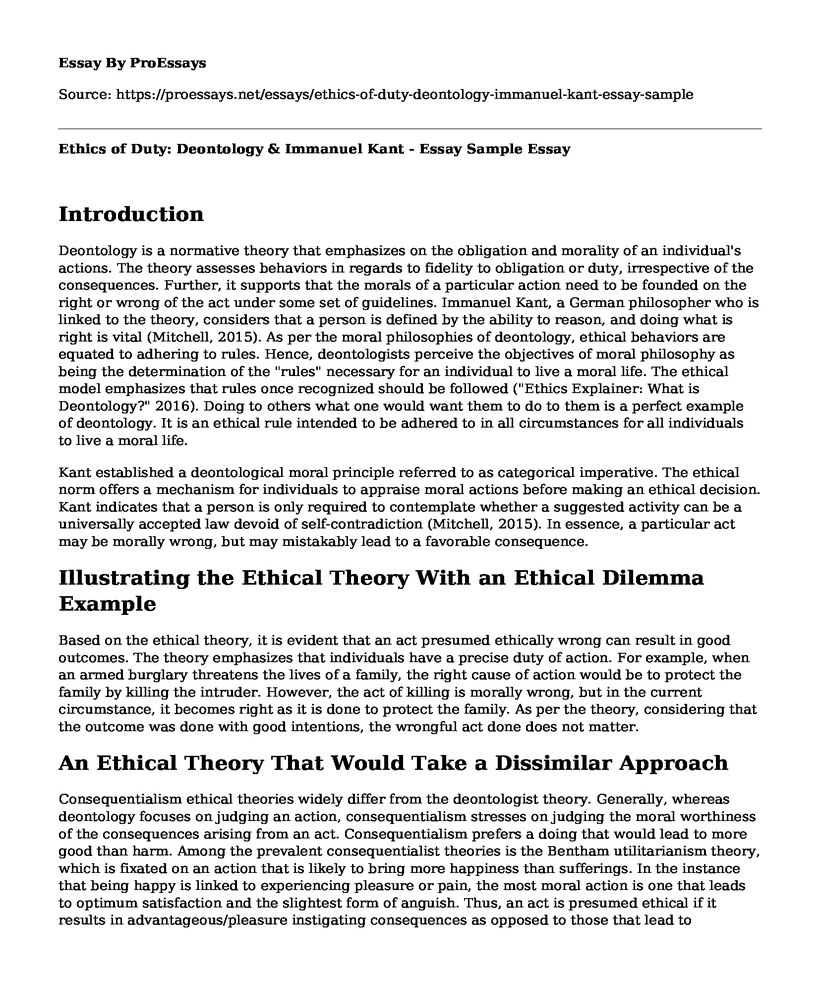Introduction
Deontology is a normative theory that emphasizes on the obligation and morality of an individual's actions. The theory assesses behaviors in regards to fidelity to obligation or duty, irrespective of the consequences. Further, it supports that the morals of a particular action need to be founded on the right or wrong of the act under some set of guidelines. Immanuel Kant, a German philosopher who is linked to the theory, considers that a person is defined by the ability to reason, and doing what is right is vital (Mitchell, 2015). As per the moral philosophies of deontology, ethical behaviors are equated to adhering to rules. Hence, deontologists perceive the objectives of moral philosophy as being the determination of the "rules" necessary for an individual to live a moral life. The ethical model emphasizes that rules once recognized should be followed ("Ethics Explainer: What is Deontology?" 2016). Doing to others what one would want them to do to them is a perfect example of deontology. It is an ethical rule intended to be adhered to in all circumstances for all individuals to live a moral life.
Kant established a deontological moral principle referred to as categorical imperative. The ethical norm offers a mechanism for individuals to appraise moral actions before making an ethical decision. Kant indicates that a person is only required to contemplate whether a suggested activity can be a universally accepted law devoid of self-contradiction (Mitchell, 2015). In essence, a particular act may be morally wrong, but may mistakably lead to a favorable consequence.
Illustrating the Ethical Theory With an Ethical Dilemma Example
Based on the ethical theory, it is evident that an act presumed ethically wrong can result in good outcomes. The theory emphasizes that individuals have a precise duty of action. For example, when an armed burglary threatens the lives of a family, the right cause of action would be to protect the family by killing the intruder. However, the act of killing is morally wrong, but in the current circumstance, it becomes right as it is done to protect the family. As per the theory, considering that the outcome was done with good intentions, the wrongful act done does not matter.
An Ethical Theory That Would Take a Dissimilar Approach
Consequentialism ethical theories widely differ from the deontologist theory. Generally, whereas deontology focuses on judging an action, consequentialism stresses on judging the moral worthiness of the consequences arising from an act. Consequentialism prefers a doing that would lead to more good than harm. Among the prevalent consequentialist theories is the Bentham utilitarianism theory, which is fixated on an action that is likely to bring more happiness than sufferings. In the instance that being happy is linked to experiencing pleasure or pain, the most moral action is one that leads to optimum satisfaction and the slightest form of anguish. Thus, an act is presumed ethical if it results in advantageous/pleasure instigating consequences as opposed to those that lead to detriments/pain. Unlike deontology, it would be challenging for a consequentialist to determine the outcome of every action ("Ethics Explainer: What is Consequentialism?" 2016). Further, the theory makes it difficult to evaluate the most morally preferred decision when faced when an ethical dilemma. For instance, one may wonder whether it would be best to donate money to a charity or utilize the money in studying medicine and then later save lives as a health professional.
References
Ethics Explainer: What is Consequentialism? The Ethics Centre (2016). Retrieved 28 February 2020, from https://ethics.org.au/ethics-explainer-consequentialism/
Ethics Explainer: What is Deontology? The Ethics Centre (2016). Retrieved 28 February 2020, from https://ethics.org.au/ethics-explainer-deontology/
Mitchell, H. (2015). Roots of Wisdom: A tapestry of philosophical traditions. Boston: Cengage Learning.
Cite this page
Ethics of Duty: Deontology & Immanuel Kant - Essay Sample. (2023, Apr 10). Retrieved from https://proessays.net/essays/ethics-of-duty-deontology-immanuel-kant-essay-sample
If you are the original author of this essay and no longer wish to have it published on the ProEssays website, please click below to request its removal:
- Armstrong's Unethical Behavior - Case Analysis Sample
- Defending Walls' Arguments on Ethics and Morality
- Paper Example on Modern Rangers: Ethics and Leadership
- Ethical Issues Essay Example
- Socrates Definition of Virtue Essay Example
- Essay Sample on Descartes' Belief: Knowledge Beyond Doubt
- Essay Example on God's Purpose for Us: From Creation to Christ







